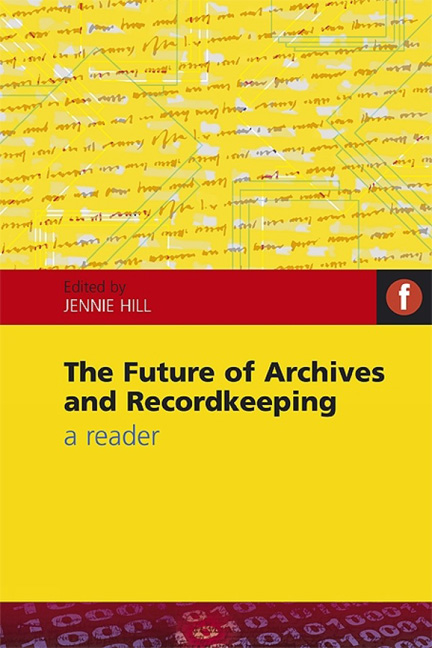Book contents
- Frontmatter
- Dedication
- Contents
- Acknowledgements
- Contributors
- Introduction: seeing the future of archives and recordkeeping
- Part 1 Defining archives
- 1 Where do we come from? What are we? Where are we going? Situating the archive and archivists
- 2 Encounters with the self: archives and research
- 3 Strangely unfamiliar: ideas of the archive from outside the discipline
- Part 2 Shaping a discipline
- Part 3 Archive 20: archives in society
- Part 4 Archives in the information age: is there still a role for the archivist?
- Index
- Miscellaneous Endmatter
- Miscellaneous Endmatter
- Miscellaneous Endmatter
3 - Strangely unfamiliar: ideas of the archive from outside the discipline
from Part 1 - Defining archives
Published online by Cambridge University Press: 08 June 2018
- Frontmatter
- Dedication
- Contents
- Acknowledgements
- Contributors
- Introduction: seeing the future of archives and recordkeeping
- Part 1 Defining archives
- 1 Where do we come from? What are we? Where are we going? Situating the archive and archivists
- 2 Encounters with the self: archives and research
- 3 Strangely unfamiliar: ideas of the archive from outside the discipline
- Part 2 Shaping a discipline
- Part 3 Archive 20: archives in society
- Part 4 Archives in the information age: is there still a role for the archivist?
- Index
- Miscellaneous Endmatter
- Miscellaneous Endmatter
- Miscellaneous Endmatter
Summary
Introduction
The archive has become contested territory. In an age identified as postepistemological (Cheetham et al., 1998, 2), there has been encroachment in the field of archives from a number of disciplines whose scholars were previously accustomed to viewing the archive as a common resource, but who seem now to have settled within its boundaries and claimed ownership. Perhaps mindful of Derrida's (1996, 90) warning ‘Nothing is less reliable, nothing is less clear today than the word “archive”’, few have attempted definitions but many have claimed the right to identify what is archival, to categorize archival characteristics and alternately to castigate or celebrate the archive's power. In the process, the idea of the archive with which the professional archivist is familiar has become overlaid and blended, even diluted or adulterated, with concepts drawn from the newly engaged disciplines: the text, the oeuvre, the corpus, the canon and the repertoire. In associated literature the archive has also become almost indistinguishable from other types of resource: the library, the museum and the archaeological site. Indeed, as a cultural keyword (Williams, 1976), it has come to stand for all these concepts (Chabin, 1996, 2002 and 2005). The archive thus identified, however, may seem strangely unfamiliar, even threatening, to those who have by tradition acquired, preserved and made archives accessible.
The aim of this chapter is to explore the understanding of the archive in other disciplines, especially those of history, art and literary studies, from the perspective of the archivist. It will therefore be discussing issues in which this author is neither a participant, nor from which time has provided sufficient distance for critical overview and assessment. It cannot claim to represent the practitioners whose productions are discussed, nor do they all contribute to a single, cohesive project. Every example cited has its counter-example: an alternative and contradictory appraisal could readily be composed. All this chapter aims to do, therefore, is share an understanding of the current situation and identify possible points of contact and potentials for productive dialogue. Although as archivists we may feel estranged by some definitions of ‘the archive’ found in other disciplines, nevertheless it is hoped that readers may also see parallels.
- Type
- Chapter
- Information
- The Future of Archives and RecordkeepingA reader, pp. 41 - 66Publisher: FacetPrint publication year: 2010
- 1
- Cited by



